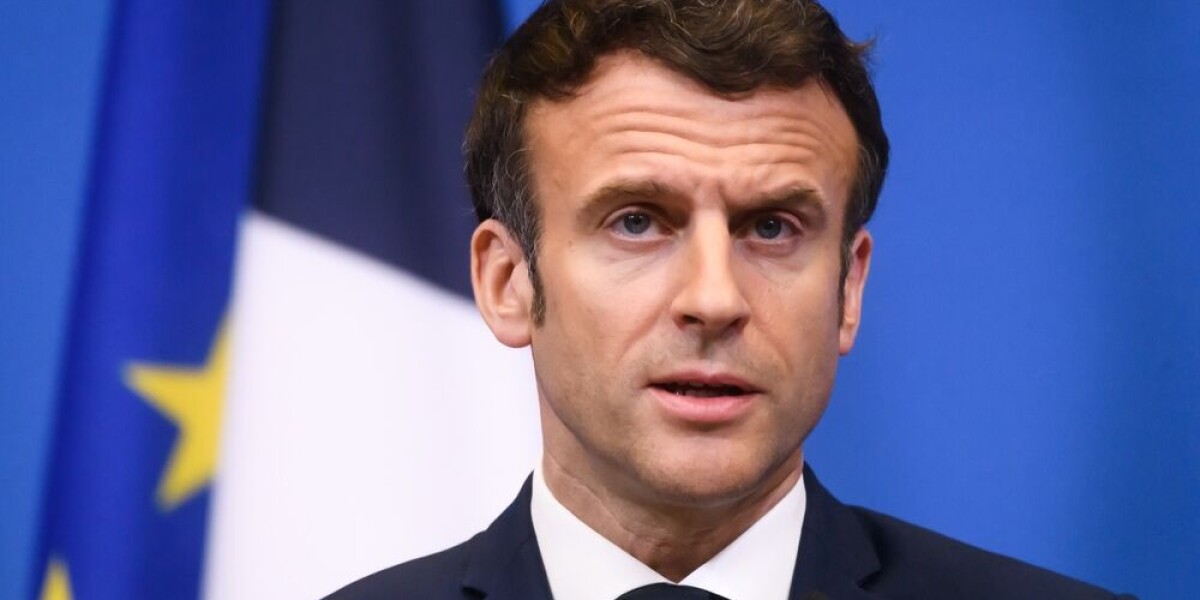
Macron: why i called snap french election and won’t resign if we lose
- Select a language for the TTS:
- UK English Female
- UK English Male
- US English Female
- US English Male
- Australian Female
- Australian Male
- Language selected: (auto detect) - EN
Play all audios:

President Macron laid out his battle plan for the upcoming parliamentary elections and defended his record, taking aim at the extremes on both the right and the left, in a 90-minute plus
press conference today Wednesday (June 12). He stood by his decision to call the snap election on Sunday, June 9 in response to his party’s defeat in the European elections by the
Rassemblement National [RN]. The election will take place in two rounds on June 30 and July 7, 2024. France needed a “moment of clarification” at the polls following the European election
results, Mr Macron said. He took “responsibility” for not having provided a “sufficient response” to the “concerns” of the French, when questioned about the rise of the far-right RN. “If I
thought I had done everything well, I would not be here in front of you today, I would not have dissolved parliament,” he said. Read more: Far-right win French EU elections: how did your
area of France vote? The votes cast in the European elections put “the extremes” at nearly 50%, he said. “This is a political fact that cannot be ignored”, he added, saying the French had
expressed their concern over security, immigration and purchasing power. “Our country faces many challenges and cannot be blocked by extremes.” Mr Macron justified his decision to dissolve
parliament, saying coalitions were “not possible” with other political forces to govern “despite all efforts made”. Having no absolute majority in the National Assembly, his party had been
forced to negotiate on a bill-by-bill basis. NO RESIGNATION Mr Macron said he would not resign if his party did not win the parliamentary election, calling the idea “absurd”. He also ruled
out a debate with the RN’s Marine Le Pen before the election. DEMOCRATIC PACT He called for a “central, progressive, democratic and republican bloc”, calling out to “our compatriots and
political leaders who do not identify with the extremist behaviour” to unite to “build a new majority”. RIGHT-WING ALLIANCE Mr Macron said right-wing Les Républicains (LR) leader Eric
Ciotti had “made a deal with the devil” by supporting an alliance with the RN, a move that caused a political earthquake on Tuesday. Mr Ciotti took many by surprise in his LR party by
calling for the pact, which was swiftly criticised by many key LR figures. LEFT-WING ALLIANCE Mr Macron also criticised the alliance of the left-wing Socialists, La France Insoumise [LFI]
Greens and Communist Party, which was announced on Monday, as “indecent”. “We have unnatural alliances at both extremes,” he said. He accused LFI of failing to condemn anti-Semitism, and
suggested the LFI’s Jean-Luc Mélenchon would be the alliance’s choice for prime minister. RASSEMBLEMENT NATIONAL The president said he did not “want to give the keys of power to the
far-right” in the 2027 presidential election. “I have confidence in our compatriots… I don’t think the worst could happen,” he said. OTHER KEY TAKEAWAYS FROM THE PRESS CONFERENCE Pensions
will remain indexed to inflation Mr Macron promised pensions would “remain indexed to inflation” and accused both the far-right and far-left of wanting to “bankrupt” France’s pension
system by reversing his controversial 2023 pension reform. “What are they proposing for our retirees?” he asked. Read more: Is there a way to check my French pension contributions? Eight
new nuclear reactors Mr Macron announced plans to build eight new nuclear reactors, which would be “essential” for France’s green transition and reindustrialisation. Targeting young people
The share of young people who had turned toward the far-right was a concern, the president said. “It is our role to go and win them back,” he said. Read more: Jordan Bardella: his
unflattering nickname and 1.5m Tik Tok fans Recognigses 'unease' of rural residents At the same time, the president said he bore some of the responsibility for failing to respond
"quickly and radically [to...] the unease that exists in rural areas" or the "feeling of decline that exists in some of our neighbourhoods". This includes for children,
who Mr Macron said "are not looked after in the same way depending on the neighbourhood they come from". Banning mobile phones for under-11s Mr Macron said he was in favour of
banning smartphones for children under 11-years-old, saying “the government will have to make clear decisions to protect our children”. Electoral reform in New Caledonia ‘suspended’ The
president said the electoral reform in the French overseas territory of New Caledonia would be “suspended” to “give full force to the dialogue there and the return to order”. The reform
sparked violent riots on the island in May, in which eight people died. The government declared a state of emergency in response that included curfews. Read more: EXPLAINED: Why France has
declared state of emergency in New Caledonia
